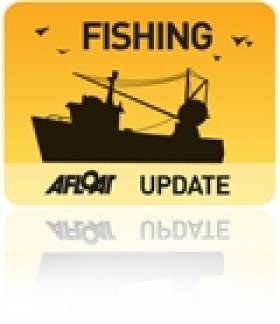Displaying items by tag: Minister Séan Connick TD
Sea-Fisheries Protection Authority's "Guide to Compliance for the Irish Inshore Fleet" is Launched
Minister Séan Connick TD, Minister of State at the Department of Agriculture, Fisheries and Food (with special responsibility for Fisheries and Forestry) launched the Sea-Fisheries Protection Authority's (SFPA's) "Guide to Compliance for the Irish Inshore Fleet", today, Wednesday 28th July, at an event organised on board the LE Eithne at Galway Docks. The "Guide to Compliance for the Irish Inshore Fleet" is a concise guide that summarises the principal requirements that apply to Irish fishing vessels under 15 meters operating in Irish inshore waters.
The guide was developed through ongoing cooperation between the SFPA and the Irish South and East Fish Producers Association, the Kilmore Quay Harbour Users Group in conjunction with the Ministerial appointed Sea-Fisheries Protection Authority Consultative Committee and other industry stakeholders. The intention of the project was to provide a clear concise guide to the various technical regulations that apply to inshore fishing activities in a user-friendly format. The provision of good information to stakeholders is a key element of the SFPA's compliance strategy and this guide supports the SFPA and Industry in their work towards building a culture of compliance.
The guide does not purport to represent a detailed legal interpretation of the legislation however it does consolidate in one user-friendly document the main requirements which apply to Irish vessels fishing in Irish inshore waters. It addresses areas such as quota restrictions, boat markings, gear requirements, authorisations, sales notes, transport documents, marine protected areas, fishing restrictions, hail requirements, effort recording, effort reporting, minimum sizes and food safety. This comprehensive guide will also help fishermen navigate the paperwork that goes with fishing including completion of the fishing logbook and the registration of the fish after landing. The guide is produced on water proof and tear resistant paper suitable for use on board inshore fishing vessels and will be distributed to all inshore fishermen by the SFPA.
Peter Whelan, Chairman of the SFPA, said: "The production of this guide is a very positive development and had been widely supported by the fishing Industry Representatives and the Consultative Committee. This partnership approach benefits both the fishing industry and the SFPA and underpins the day-to-day efforts of fishermen to protect their livelihoods by complying with legislation that conserves fishing stocks for long-term sustainable exploitation. It is consistent with our legal remit to promote compliance with and deter contraventions of sea-fisheries law and food safety law. The SFPA are very pleased with the strong move towards compliance being demonstrated by the Irish Fishing Industry and this guide aims to support that move."





























































